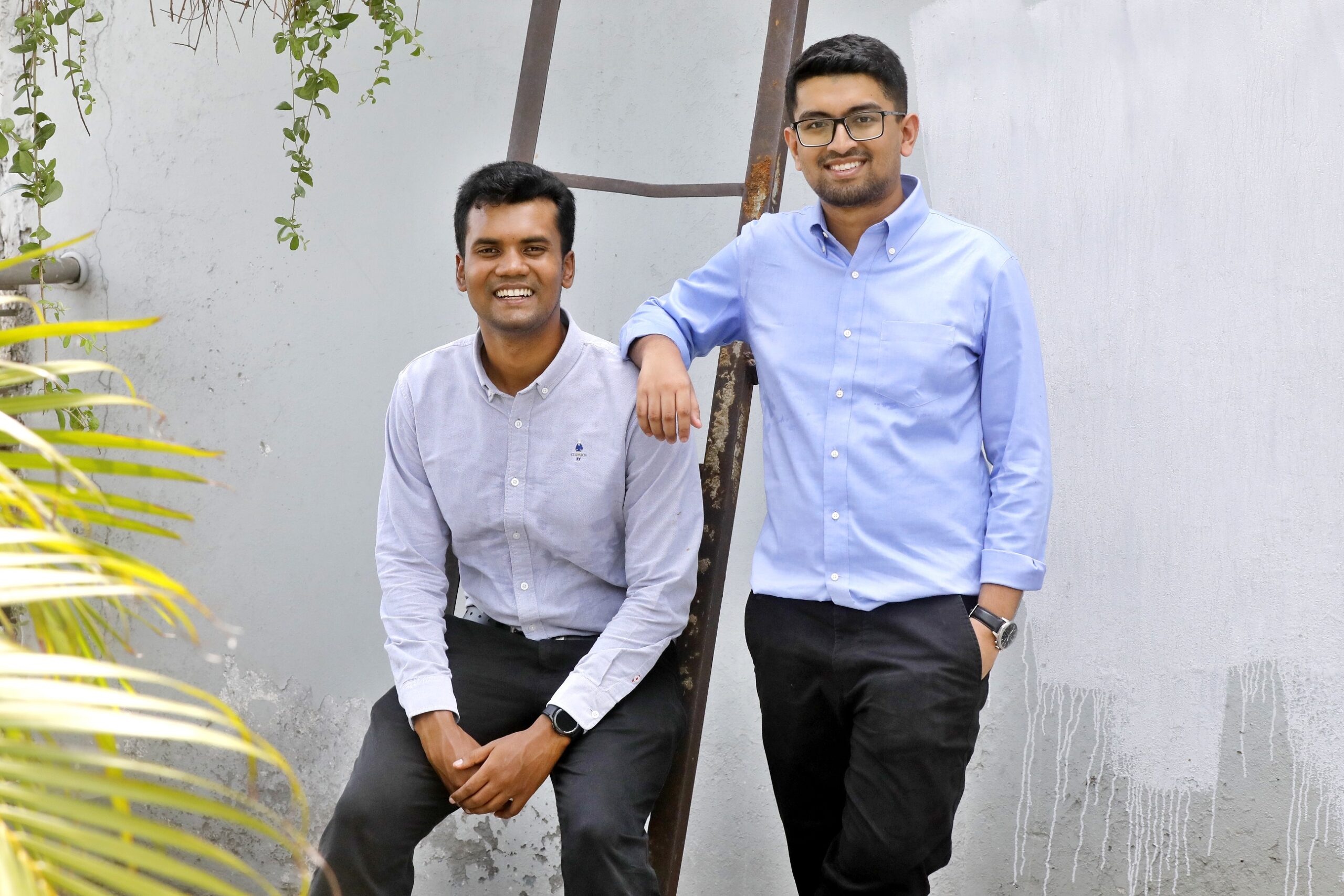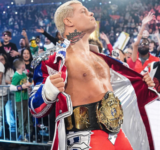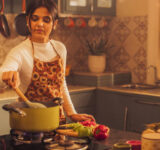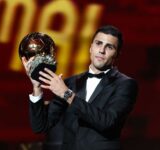The competitive world of debating is highly strenuous and demanding. Although it may seem like any other after-school activity, it actually has a lot to offer in terms of self-growth, knowledge, interpersonal and intrapersonal skills, and building networks and friendships. The sport requires you to expand your knowledge on almost every topic including the social sciences, gender studies, pop culture, international relations, and so on.
After years of hard work and time invested in debating, Sajid Asbat Khandaker and Sourodip Paul, representing team BRAC A, have made history by reaching the pinnacle of the debating world, the World Universities Debating Championship (WUDC) 2022. The two won the Open Finals of the Belgrade WUDC 2022 making them the first team ever from Bangladesh to make it to the finals of this prestigious event.
Sajid and Sourodip both started debating around 2013 during their school days representing Dhanmondi Tutorial and Notre Dame College respectively. With nearly a decade’s worth of experience, they have had a journey filled with good memories, valuable lessons, and a fair share of failure. During their successful debating career, they have not only achieved multiple accolades but also created a close network on which they can now rely on. It was around 2017 that Sajid and Sourodip started teaming up for local and international tournaments representing the Institute of Business Administration, University of Dhaka (IBA-DU). Since then, they have learned to work as a team, understand each other’s weaknesses and strengths, and eventually, achieve one of the highest recognitions in the debating world.
Sajid uses the analogy of football to put into perspective what it means to have won WUDC. In football, there are multiple tournaments like the Premier League and the World Cup. Essentially, becoming the champions of WUDC is equivalent to winning the World Cup. “We participated in the tournament thrice during our undergrad and made it to the quarter-finals twice but we didn’t win. You idolize other debaters who have become world champions, and you learn from them.
This was one of those unfulfilled dreams we had. So, this was reaching self-actualization of the activity you could say,” says Sajid.
For Sourodip, the achievement still feels unreal. “When we started debating, coincidentally it was another BRAC team that had won WUDC that year in the English as second language category. At the time, we were thinking that it would be a great achievement even if we could even qualify for the open category which is open to the Harvards and Cambridges of the world.
Once Sajid and I started debating we wanted to qualify for the open knockouts at least once in our careers since Bangladesh had only done that maybe twice before. From that, being able to win the whole thing still seems unreal to me,” he elaborates.
Oftentimes we assume that individual progress and success are enough, especially in extracurricular activities. However, debating is one sport where harmony and coherence in the team are essential to the individual debater’s success. This is something Sajid and Sourodip have learned to master over the years. Their win did not come overnight, nor was it just with years of experience. Sourodip and Sajid had been friends long before they started teaming up.
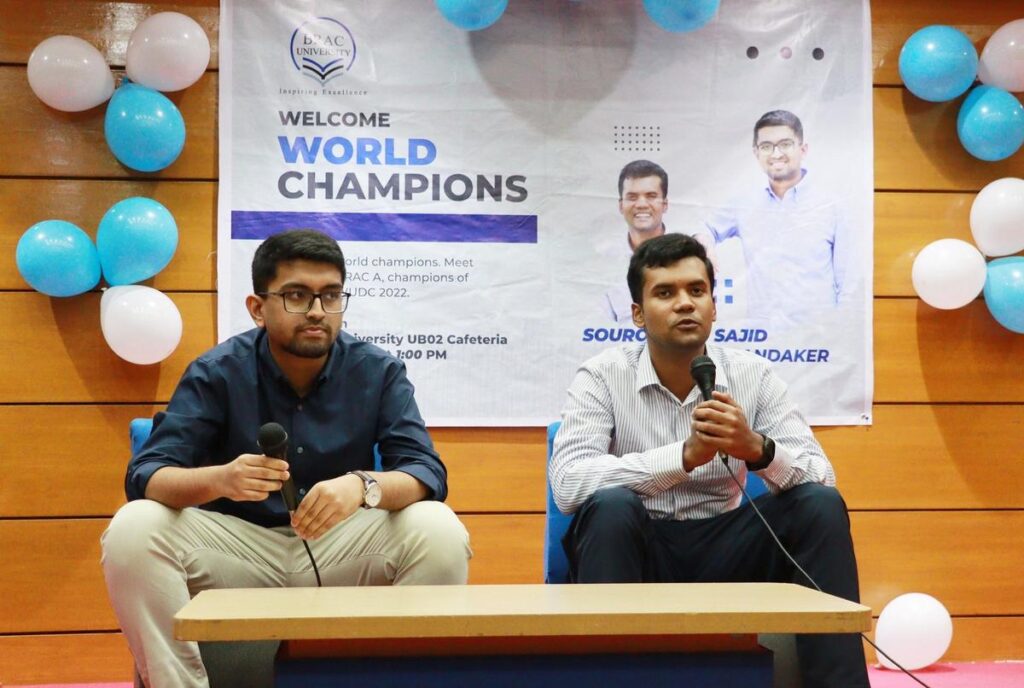
“We already had a certain level of understanding towards one another,” says Sajid. It was crucial for them to appreciate each other’s strengths and weaknesses and be open to feedback when necessary.
The bond the two of them share, along with their ambition to excel in their debating careers, was pivotal for their win. Sajid goes on to elaborate, “For both of us, team success mattered more than anything else. Hence, we were very candid in our feedback and very positive about improving each other rather than holding on to the negative parts. It was not easy, it took work.” Both of them agree that their team chemistry is strong and is one of their advantages.
Additionally, they share the same sentiment in complimenting each other’s unique skill sets. Sourodip goes on to add, “I understand that I have my limitations, Sajid does as well, we both recognize our limitations. Moreover, our strengths don’t overlap and we have our own unique strengths. Of course, we have our disagreements but that way we streamline it is something we’ve learned to do over the years through our experiences.”
Sourodip shares a small experience to further highlight their congeniality. “When I would speak to other debaters and teams, I would hear about their conflicts. This is something I never had to experience for myself with Sajid because of the long-standing relationship and friendship we had.”
To truly understand how crucial friendship, teamwork, effective communication, and empathy are in debate, let’s take a glimpse into how the duo prepared for WUDC 2022.
They both have their own ways of soaking up information. Sajid prefers reading articles, books, and other reading material, and Sourodip prefers more audio-visual mediums like YouTube videos and podcasts. Furthermore, both of them currently have full-time jobs at Unilever and The World Bank respectively, and were not able to invest as much time this year compared to their previous WUDCs. Sajid explains, “I was more prepared for my previous WUDC because I was in university and I did not have a full-time job. I could spend more time reading articles and preparing. For this time, I think what prepared us the most is that we are far more mature as debaters and as human beings since the last WUDC we did 2 years ago.” For this time around, they brushed up on the basics, focused on recent events, and did a few practice rounds. Furthermore, they agreed that they would not complicate things in certain rounds. “Instead of overstressing during their prep time, we kept it simple,” Sajid adds.
Debating is not just about teams presenting their cases and rebuttals. It provides a platform for like-minded individuals to gather and carry on the dialogue outside the room.
Sourodip sheds light on this aspect and elaborates how for a nerd like him, being able to talk about issues that interest him with people from different regions, who present different perspectives, adds to his understanding. The exposure he has gained from debating sensitive issues, cultures, and people has made him more empathetic. Simultaneously, it has contributed to making him a more critical, analytical, and logical individual. Moreover, the knowledge and perspectives he has gained from debating certainly add to his career in terms of understanding the economy, presenting and analyzing cases, and such.
This win was not just for Sajid and Sourodip. It was a win for the Asian subcontinent.
Although in our curriculum debating might seem unattractive due to the lack of resources and funding, the international debate community has more to offer. Sourodip comments on the systematic racism pervading in resources allocated for Asian countries to excel in activities like debating. He points out that institutions like Oxford and Cambridge have a much higher budget allowing them to invest in the sport. “We are under-resourced and that is not speaking as a Bangladeshi debater but as an Asian debater. There is a feeling of pride, joy, and happiness being the first team to bring it home to Asia. I probably did not dare imagine it back in 2016,” he expands.
He advises novice debaters to stick to debating if they are passionate about it even if they do not get any success. He argues that the entire debating culture is more than just competition.
“I found some of my best friends while debating, people with whom I probably never would’ve met if it weren’t for international tournaments. They have certainly imprinted on my personal growth and journey.
Debating allows you to think from different angles, rebut and question a lot of things. In summary, you can gain a lot of skills and find a support system along with an international community to fall back on when you need to.” He further advises newbies to keep up with debating trends – how the top debaters are structuring their arguments, what tactics they implement, and so on. “We learn from the Virat Kohlis of the world, it’s the same for debating. Watch their videos and try to emulate them to an extent till you can develop your own style,” he recommends.
Both Sajid and Sourodip have had their fair share of downfalls and failures. However, this failure is nothing to be afraid of. Sajid emphasizes that failure is valuable in learning and that it does not imply absolute defeat. It is simply a stepping stone in the learning process for any sport. With each failure, you learn where and how to improve. Learning to embrace failure instead of fearing it can open many tangible and intangible doors.
The key takeaway from our conversation with Sajid and Sourodip is that there is more than meets the eye when it comes to debating. The strength of dialogue, keeping the conversation going and making new experiences, discovering who you are as a person, making new friends, and exposing yourself to different cultures are part and parcel of debating. Enjoy it as much as you can and for long as you can. At the end of the day, you have nothing to lose and everything to gain.

